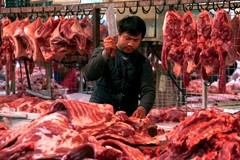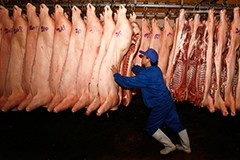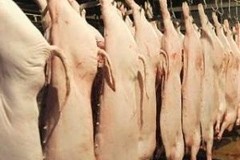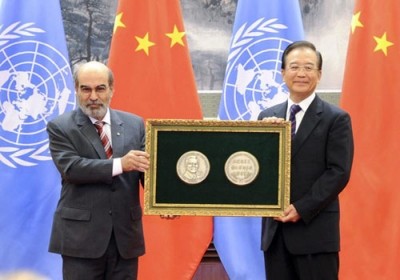China predictions
Subsidies to rise while pork production still falls short of demand

As the Chinese government boosts agriculture productivity in its drive to ensure national food security, a new report has suggested that government subsidies will continue to grow.
In 2011, this spending reached CNY134.5bn (US$21.2bn), with a large portion being channelled into seed, fertiliser and fuel subsidies. However, Business Monitor International, in its China Agribusiness report for the first-quarter of 2013, outlines that the country will inevitably grow more reliant on imports of key grains such as corn, wheat, sugar and even rice in the long-term as consumption growth exceeds production growth.
While yield improvement would be the fastest way to meet growing demand, the report notes that a recent verbal acceptance of genetically modified seeds is an acknowledgement of the need to recalibrate the government's previously staunch stand against GM products in this respect.
Pork on a slow curve
Although Business Monitor forecasts slower-than-average pork consumption growth in 2012/13 due to a weakened economy, production will come short of demand for the fourth consecutive year.
China should also maintain a healthy appetite for pork imports, with the US being the largest supplier, accounting for 44% of China's total imports. The authors expect China to intensify its imports over the coming years, as imported pork is becoming increasingly competitive due to rising production costs, animal disease outbreaks, environmental threats and food safety concerns.
It adds that pork production will remain supported by government policies, such as setting up a futures market and maintaining an active intervention policy, as well as by the ongoing industrialisation of the sector.
“However, we believe the industry will remain highly vulnerable to the lack of land availability, environmental concerns, seasonal consumption and volatile as well as thin margins,” it says.
The authors predict that pork production to 2016/17 will grow at 19.4% to 61.6m tonnes, with production continuing to be encouraged by elevated local livestock prices. The increased availability of vaccinations and the ongoing commercialisation of the industry are also likely to boost output in the coming years.
Dairy producers milking it
The report also considers how Chinese dairy companies have now become significant global players, ranking among the world's largest in terms of market sales.
“With US$5.8bn each in dairy turnover in 2011, Yili and China Mengniu Dairy even overtook some of Europe's and North America's traditional players, such as Bongrain, Muller and Schreiber Foods,” it notes.
Business Monitor outlines that the global dairy market is shifting towards emerging markets, especially Asia, which the authors expect will enjoy strong consumption growth over their forecast period to 2015/16.
“Fifteen out of the largest 20 dairy companies globally have investments in manufacturing in China, one of the most promising markets in Asia. The presence of foreign groups in the Chinese dairy industry is likely to intensify in the coming years, and China will experience further consolidation among its domestic dairy industry,” the authors conclude.
Meanwhile, hot weather and an outbreak of fungal disease have limited the 2012/13 wheat crop, which was harvested in June-July 2012. As a result, the authors have revised down their production forecast to 108m tonnes.
Despite being high compared with historic averages, the report suggests that wheat production will not be above consumption in 2012/13 for the first time since 2005/06.
“We expect China's production surpluses to end in 2013/14 and for the deficit to widen in the coming years on the back of subdued production growth and soaring demand. Output expansion is being constrained by a low availability of farming land. Moreover, China already boasts of high wheat production yields, at 4.9 tonnes/ha in 2011/12, compared to 5.4 tonnes/ha in the EU,” it says.










